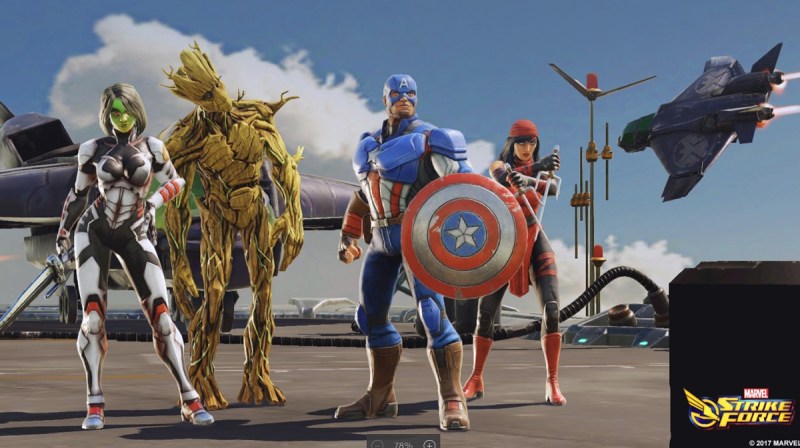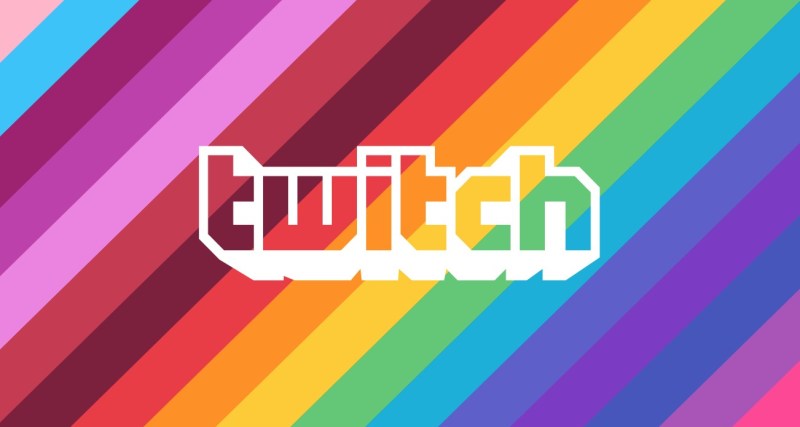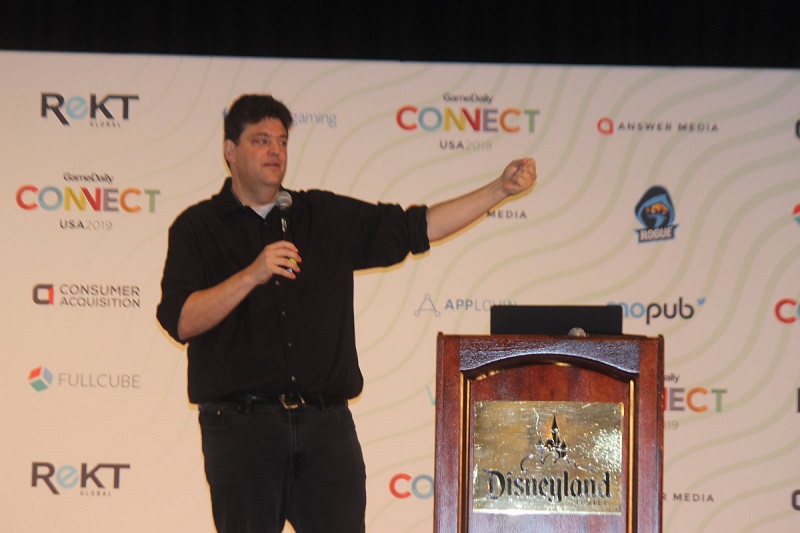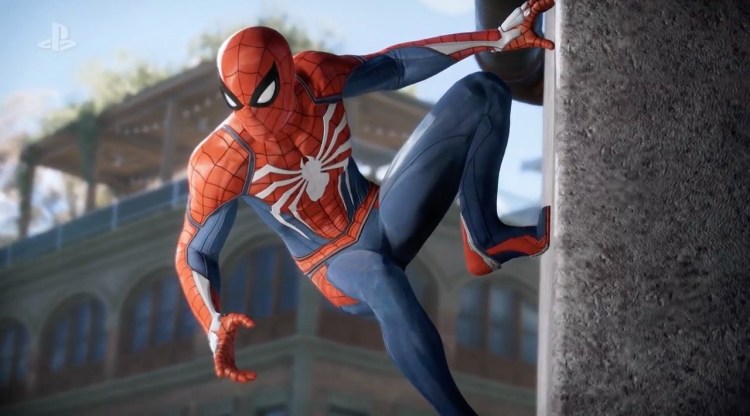
Above: Marvel Strike Force lets you join alliances with up to 24 players.
McMahon: It is really hard. We obviously had conversations about this back in the day when I was at Fox. This is a bit dated again, but I can’t imagine the market has changed that much in four or five years. Part of what drove me to the mobile side of games is it was just very formulaic. It was taking a long time to get everyone’s heads around digital and change it up.
It is a bit about demonstrating value to them. What can you do? Even if it’s a small core audience, you have the ability to push to them directly. The other thing I would say, though — theatrical is the lead bit of it, but then there’s going to be the international piece. There are franchise groups now at most of the studios. There’s going to be a second window, and a third window. How are you going to get to places where the game can have super longevity, and then talk to people later when they’re a little more amenable to it?
That first window of marketing, I was always banging my head against the wall internally trying to get advocates for it, because I knew this was valuable. But aiming a little bit further out for other windows, then you start to get more flexibility. There’s more air for you to breathe.
Fowler: For Marvel Strike Force, my marketing guys do live in Los Angeles. But it depends on what kind of game you have. If you’re running a game as a service like we are, putting on a show every day, you’re always working on what the next content release is. Having a really good partnership with your licensor will give you early information what they have in their pipeline too. You can make informed decisions.
June 5th: The AI Audit in NYC
Join us next week in NYC to engage with top executive leaders, delving into strategies for auditing AI models to ensure fairness, optimal performance, and ethical compliance across diverse organizations. Secure your attendance for this exclusive invite-only event.
Maybe I don’t have the license to Avengers Endgame, but I have all those characters in my game. I can make sure my live ops calendar is synched for when Endgame promotion starts to go live. I’m re-creating my key art and having Avengers characters on the front end. I know there’s a story that does X, Y, or Z. I’m going to make a legendary event in our game that features that same kind of story.
Also, briefing your licensors — “Hey, we’re going to do these things!” — that might spark their ideas. They could do a social promotion around this character that’s maybe not Captain America, but some smaller character. If you feature him in an event, then they’ll give you Facebook and Twitter mentions. They have millions more followers than we do, so that’s super important.
It doesn’t always have to just be, “We need you to promote our game on the end slates of your TV trailer ads.” You don’t have to think about that. You can think much lower down, all the grass roots efforts that go behind whatever you’re doing.
Costantini: A lot of the studios have fandom teams. They’re a great entry point for it. Also, find the gamers on the theatrical marketing team, because there are starting to be a lot of them. If you find someone who’s passionate about games, they can be your advocate. You have to build that link.
McMahon: When I worked with TV properties, there was always so much more interaction with the writers’ work and the production, and so much more territory for promotion. Compared to working on the TV side of Fox, film is still seen as just art. When we started working with the Marvel and Lightstorm folks, they were much more forward-thinking. But on a regular movie, it’s sometimes quite tough. It’s already been planned by the time you get any sense of what you can do. With TV there’s a lot more flexibility and a lot more assets you can use.
Audience: Both Hollywood and games as industries have been pretty punishing to underrepresented communities. What are you and your partners doing to reach out to those markets?

Above: Twitch continues to grow and change.
Fowler: I don’t know if this exactly answers your question, but we worked with Marvel around Pride week about eight months ago. We said, “Hey, we’d like to do something around this,” and they have a character — because they have a character around everything — named America Chavez. She was a pretty obscure comic character, a recent comic character. We loved her, and we said, “We want to build her and put her in the game. We’ll have a blitz event around her. What can you do for us?”
Jointly we went together to Apple and we pitched it to their editorial staff. If you open up the App Store now you don’t see game lists anymore. You see a bunch of editorial stories. They loved the idea, and featured an editorial piece for us when we put the character in the game. Marvel also promoted it during Pride week. It ended up being the most successful, from a KPI perspective — it drove the most installs we’ve ever seen from an editorial piece on Apple. It was a really successful collaboration.
Dorf: Nothing to do with Hollywood and games, but Amazon sends out an email every day to its employees on diversity and inclusion, including links to articles, videos, book suggestions, everything else. There’s an internal system for badges and stuff, so the more you participate and interact with that, the more you get. It’s been truly uplifting for the company. 800,000 employees get this every day.
Costantini: If you look at the films we’re putting out, the games we’re putting out, the characters we’re highlighting, I think we’ll see a strong shift in that direction. We’re not the only ones. It should have happened decades ago, but we’re starting to see more and more of a shift.
Audience: One of the biggest challenges I face as an ad creative using IP-based characters, how long does it take to get this approved? Major League Baseball takes three months. Hollywood can take a very long time. What’s the restriction? What’s the play here for advertising people? With all this data and transparency in our networks, what can we do to work with you guys on this?
Fowler: Marvel might be unique, because they have 15 people where that’s their job. They have software developed. They have their own proprietary approval software we use. They’re really good at it.
It can be challenging. It depends on the licensing partner.
I’ll give you a little funny case study here. In our game Storyscape, we have Titanic stories. You don’t actually play Rose and Jack. You play a woman who’s on the same ship. But guess what, it sinks. No matter what choice you make, it always ends up going down. Anyway, the game has multiple IP. It has Titanic in there. It has X-Files in there. It has original stuff.

Above: Aaron Loeb is president of FoxNext Studios.
We have this very racy story called Life 2.0. It’s thirtysomethings in San Francisco who all sleep with each other and blah blah blah. We put together this trailer, a compilation trailer that we wanted to have as the sizzle trailer on the app stores. We brought it to Landau to get approval for Titanic, and all he commented on was the Life 2.0 stuff. “I can’t approve this because there’s too many risque scenes.” Uh, you don’t own that license. But what do you do in that case? You have to still maintain a partnership and mutual respect.
Building it all into the licensing rights to make sure you get approval rights and quick turnaround in there still doesn’t really matter. At the end of the day, they have power. Even if the agreement says this is automatically approved, if I have a picture of Rose or Jack and the artist themselves doesn’t approve it, even if the time window goes by, I probably won’t ship it anyway. The partnership’s going to erode. You need to feel out your licensing partner and get a sense of what matters to them, how involved they want to be, and so on.
Costantini: If you’re ever feeling bad, just thank God you’re not doing a racing game.
Fowler: No damage. I was at Microsoft, and that was the big deal with Project Gotham Racing. All the car manufacturers making these exotic cars, none of them wanted to see their cars get scratched. That was what they wrote into all the contracts. You can have the license to Ferrari or Lamborghini so long as there’s never, ever any body damage. You can drive through mud and it comes out perfectly shiny.
Dorf: You had the early versions of Madden where the ambulance came out on the field to pick up players, and it ran over players as it went. The NFLPA didn’t know this was going in the game. We shipped that, and it was not in the game next year. [laughs]
GamesBeat: There was a very good talk yesterday by Aaron Loeb from FoxNext. One thing he highlighted was that developers should be inspired to be creative. He mentioned that your fear is not useful as a way to motivate developers to do their best work. Some of this Hollywood and games stuff is very scary, but when it works out right, it gets very creative. Hopefully everyone remembers that you can do wonderful things with Hollywood and games.
Disclosure: The organizers of GameDaily Connect paid my way to Anaheim. Our coverage remains objective.


